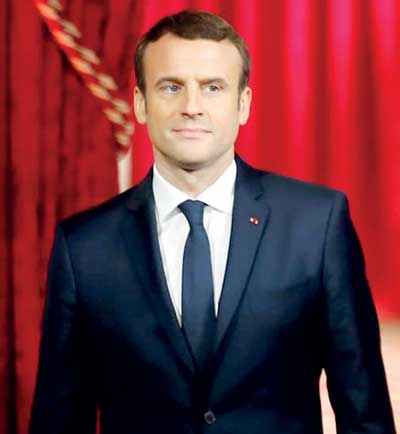Monday Feb 16, 2026
Monday Feb 16, 2026
Thursday, 8 June 2017 00:00 - - {{hitsCtrl.values.hits}}
‘Party-less’ President heading the 5th Republic – new allegiances
Perhaps even de Gaulle would not have fathomed, in his vision of creating a strong leader with the present Constitution (the 5th Republic – 1958) by splitting the powers of State and Government between a President and Prime Minister (a dual executive system) as to what may transpire if the former was elected from beyond traditional party-politics, thus maintaining a strong independence towards the People (as opposed to party loyalties); which is exactly what has now transpired with the election of the young President Macron who campaigned and won independently. 
Now, as France moves closer to its general election where they have to now elect a Parliament, a governing party and Prime Minister, daily we see a marked shift in previous campaigns, massive changes in the political landscape where traditional party candidates have now shed their “party identities” (some even moving away from using their party colours on their advertisements); in an obvious attempt to align themselves with the new and popular President and the “change” brought about by the Macron campaign.
As a student of the ever-dynamic science of politics, this is an encouraging phenomenon to observe. Does this mean that traditional politicians (and politics) will now move away from attempting to appease their party loyalists and align themselves more with the wishes of the people? Have the people finally managed to break that vicious cycle where there appeared to be no change, by showing the traditional politician that it is “the person” and not “the party” that they will elect? If so what repercussions will this have on global politics; more importantly our dear old Sri Lanka?
Underlying message in the US Declaration of Independence
When the founding fathers of the free world declared their desire to rid themselves of the colonial burden, they recorded the preamble to their wishes in the following lucid language: “...We hold these truths to be self-evident, that all men are created equal... they are endowed... with certain unalienable Rights... Life, Liberty and the pursuit of Happiness... to secure these rights, Governments are instituted... deriving their just powers from the consent of the governed, That whenever any... Government becomes destructive of these ends, it is the Right of the People to alter or to abolish it, and to institute new Government... when a long train of abuses and usurpations, pursuing invariably the same Object evinces a design to reduce them under absolute Despotism, it is their right, it is their duty, to throw off such Government...”
The difficulty we faced up to now however, until France showed us the way with this “new thinking”, is that we always expected a political party or regime to usher us this change. We did not (or could not) look beyond such whimsical party manifestos that promised us the sky and the moon (but ended up being unable even to clear a garbage dump or predict the adverse effects of monsoon rains that are as old as our history); thus the desire in us to see a change always being linked with a regime change led by a political party. We now see that France has moved away from that, which is apparent even with their present manifestos emanating from the traditional political parties at this election; some overtly promising the people that they will not nominate any family members or close associates as their personnel, all in an effort to get closer to the people “individually” and not as “a political party”.
The bane of “party politics” in our own republic
Is this not the same cancer that we have suffered from throughout our history, ever since our colonial masters handed the helms of government to our local pukka sahibs? The vicious cycle of absolute dependency on the party politician to do everything for you; from the birth of your child to the funeral speech, with the corollary allegiance of running around in bus loads to cheer their egos on at political rallies and putting up walls full of posters and cut-outs each time your “party man” wishes to run for office?
Well isn’t it time to consider what positive results (if any) such blind allegiance has secured in return for us as a people and a nation. Is it not a fact that even our “silent revolution” of 8th January, in which we thought (or were led to believe – which many of us did, rather naively) we were backing an “independent candidate” who had left his party allegiances behind after a hopper-dinner, has been later on dwindled down to a vast degree and those of us who raised our voices amidst much threat to life and limb let down, leaving us with the present party-tussle between the two major parties forming this so called “national government”; all due to the eagerness to harness party loyalty and allegiance?
Do we continue
seeing our nation through “green, blue or red glasses”?
Now that we have been backing our own party hierarchy ever since our independence, is it not time to critically evaluate what (if any) policy-based benefit we have gained by voting for such “lists of persons” placed before us by the party leadership?
If even in this 21st century we are at the mercy of weather gods, that due to slight increases in inclement weather or an excessive drought we have to lose hundreds of lives, property and more importantly suffer the massive opportunity cost of lost education of our children; surely even in the days of our Kings, without the benefit of any Doppler radar but by simply observing the weather patterns didn’t they know that the monsoons brought extra rain, the excess of which they stored in tanks and reservoirs to be managed during the dry season? If our politicians are expected to sail around in boats handing over dry rations in this manner have we come any further than the days of Noah and his ark? Do we at least now not need to think beyond blind allegiance to a colour of a political party but select good, honest men and women with integrity to exercise our sovereign legislative, executive and judicial powers to finally make policy-based decisions that will at least secure a better future for our children?
Time to think Sri Lanka – Power to the people!